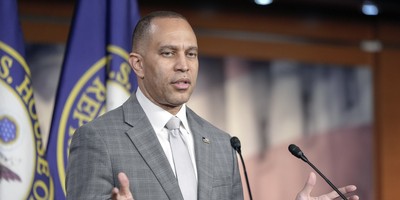WASHINGTON -- Uncontrolled government spending is far worse than previously projected just a few months ago, driving the federal budget much more deeply into debt, which threatens our economy and our future standard of living.
This fiscal year's budget deficit is expected to climb to nearly $1.5 trillion, which would be the biggest one-year deficit gap in American history, according to the nonpartisan Congressional Budget Office.
It is the result of a still weakened economy, 9 to 10 percent unemployment that has sharply cut federal tax revenues, and a Democratic Congress that was on an irresponsible, nonstop spending binge for the last two years.
The previous CBO projection for the 2011 fiscal year was $1.3 trillion, but its latest estimates show the government's fiscal position is worse than ever and could climb higher, according to independent analysts.
The latest report will give further weight to Republican efforts to make deep spending cuts in the remainder of this fiscal year, which ends in September, and next year's budget as well. All revenue and spending measures must begin in the GOP-controlled House, and the Republicans will have the upper hand in driving budget policy for the next two years at least, if not beyond.
Total government debt is now more than $14 trillion and outside budget. Experts say it will continue to rise exponentially unless President Obama's over-the-top spending policies are substantially curtailed.
How bad will our government's fiscal position get? Brian Riedl, the Heritage Foundation's lead budget analyst, paints the government's grim fiscal future in a memo released last week, which has become a must-read on Capitol Hill. Among Riedl's findings:
Recommended
-- Spending projections are actually worse than CBO's numbers show, because of the "unrealistic assumptions" that Congress requires CBO to employ to make future deficits appear smaller, such as assuming all tax cuts will expire, the AMT (alternative minimum income tax) will never again be patched, and discretionary spending will remain frozen to inflation.
-- "The ten-year deficit is actually $13.6 trillion, and annual deficits never fall below $1 trillion."
-- Ten years from now, the budget deficit "is expected to reach $1.9 trillion, and the debt will hit nearly $25 trillion, or 104 percent" of the economy's entire gross domestic product (GDP) -- "and even that assumes a return to peace and prosperity."
-- "Long-term deficits are driven by spending. Tax revenues (historically 18.0 percent of GDP) are set to climb to 18.4 percent by 2021 -- even if all tax cuts are extended. Yet federal spending (historically 20.3 percent of GDP) is projected to soar to 26.4 percent by 2021. By that point, 100 percent of rising long-term deficits will result from above-average spending."
-- Spending under this administration is driving the ocean of red ink. "Since 2001, federal spending per household has expanded $21,510 to $31,206 (adjusted for inflation)."
-- "Entitlements are the problem: between 2008 and 2021, the annual cost of Social Security, Medicare, and Medicaid is set to rise from $1.2 trillion to $2.2 trillion (adjusted for inflation)."
-- The so-called "tax cuts for the rich" are not the overriding deficit-driver. "Letting the tax cuts expire for those earning more than $250,000 would close just 5 percent of the budget deficit over the next decade. The $736 billion price tag is a fraction of the $21 trillion cost of Social Security, Medicare and Medicaid" over the coming decade.
-- "Between 2009 and 2021, the national debt would increase by $150,000 per household." By 2021, net interest alone on the total debt would cost an astounding $1 trillion, or nearly one-half of all income tax revenues.
-- "Over what would be President Obama's eight years in office, baseline budget deficits are projected to total $9.9 trillion -- triple the $3.3 trillion in deficits" accumulated by President George W. Bush.
This is the grim fiscal picture that faces the Obama administration, which is nonetheless proposing big spending increases across a large swath of the federal government, from Obamacare to more stimulus spending, more green technology spending, more R&D spending, and more for job training, to name just a few.
Obama won the presidency in part by attacking the deficits and debt under the Bush administration. But in 2007, the year before the recession hit, Bush's federal budget deficit was a tame $161 billion and total spending was a relatively low $2.7 trillion -- or less than 20 percent of GDP.
This year, with a supposedly recovering economy, spending under President Obama is nearly $4 trillion, or more than 25 percent of GDP, and the deficit is expected to soar well over $1.5 trillion.
Ever since the Democrats took control of Congress they have "used the recession as cover to permanently increase spending on the regulatory bureaucracy, entitlements and industrial policies by $1.1 trillion," says University of Maryland business school economist Peter Morici.
Obama and his party got lambasted in last year's midterm election in part because voters correctly perceived a much bigger government and runaway spending as a direct threat to their economic well-being.
Two years into Obama's spendthrift presidency, that fiscal threat is worse than ever before, severely undermining the future financial security of every American and our country's national security, as well.

























Join the conversation as a VIP Member